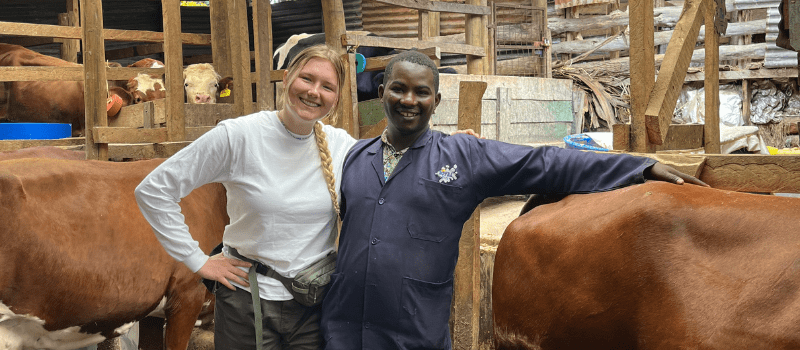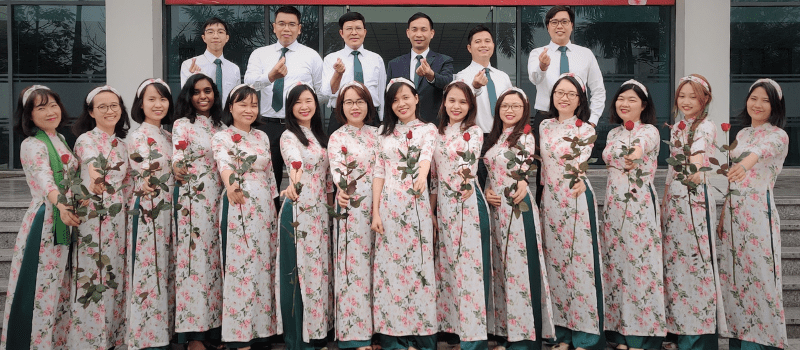#VETSVolunteerVoices brings you inspiring stories from the field, showcasing the impactful work of our dedicated VETS program volunteers. Meet Maddalena Jacobson, an Animal Health Advisor who spent three months in Kenya (May–August 2025) with our local partner, Wakulima Dairy, strengthening dairy management practices and supporting women farmers to build more resilient livelihoods.
When I first set foot on a dairy farm in Manitoba years ago, I had no idea how much it would shape my journey. I fell in love with the dairy industry—the rhythm of caring for cows, the science of nutrition, and the potential for small changes to create lasting impact. So when I entered veterinary school, I promised myself that I would spend at least one summer deepening that passion.
A friend of mine had volunteered with the VETS program in Kenya the year before. Hearing her stories—the learning, the challenges, the joy—lit a spark in me. I knew I wanted to follow in her footsteps, and I knew the VETS program would offer something rare: a chance to grow as a veterinary student while directly supporting farmers and communities.
 PHOTO: Maddalena Jacobson in Kenya.
PHOTO: Maddalena Jacobson in Kenya.
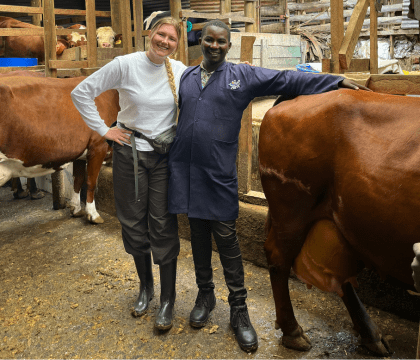 PHOTO: Maddalena and Martin, Wakulima Extension Officer.
PHOTO: Maddalena and Martin, Wakulima Extension Officer.
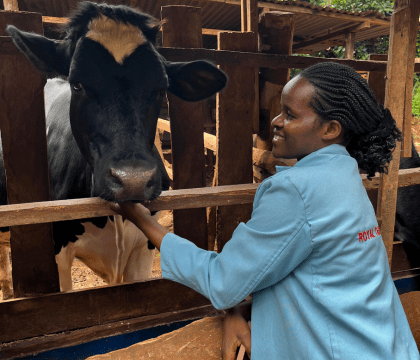 PHOTO: Rebecca Ndimo, Extension Officer and VETS leader.
PHOTO: Rebecca Ndimo, Extension Officer and VETS leader.
Teaching and Learning, Hand in Hand
From May to August 2025, I worked with Wakulima Dairy in Nyeri County, Kenya, as an Animal Health Advisor. My role was focused on training farmers and Community One Health Champions (COHCs) in practical areas of dairy management: nutrition, calf and heifer care, cow comfort, breeds and breeding, and mastitis prevention.
We created interactive flipchart lessons filled with hand-drawn diagrams—from calf pen layouts to lactation curves—to bring concepts to life. On farm visits, I often found myself crouched in a barn, tape measure in hand, showing farmers how to monitor calf growth to know when their heifers were ready for breeding.
Farmers were incredibly receptive. I remember one discussion about giving calves free-choice water from day one. Many farmers worried it would cause “red water disease.” Instead of just explaining, we invited Ann, a local COHC, to share photos of her thriving twin calves—each with their own water bucket. Seeing proof from a Kenyan farmer broke down barriers far better than I could have alone.
We also encouraged the use of sweet potato vines as a protein-rich fodder, introduced realistic bedding options for cow comfort, and highlighted how even small stall adjustments could boost milk production.
Stories of Change
One farmer I’ll never forget is Eunice Muthoni from Maganjo. When she and her husband Henry first moved from Nairobi to Nyeri in 2018, they struggled with just one heifer. By the time I met her, Eunice had absorbed every piece of training she could—introducing silage, better calf management, and proper deworming.
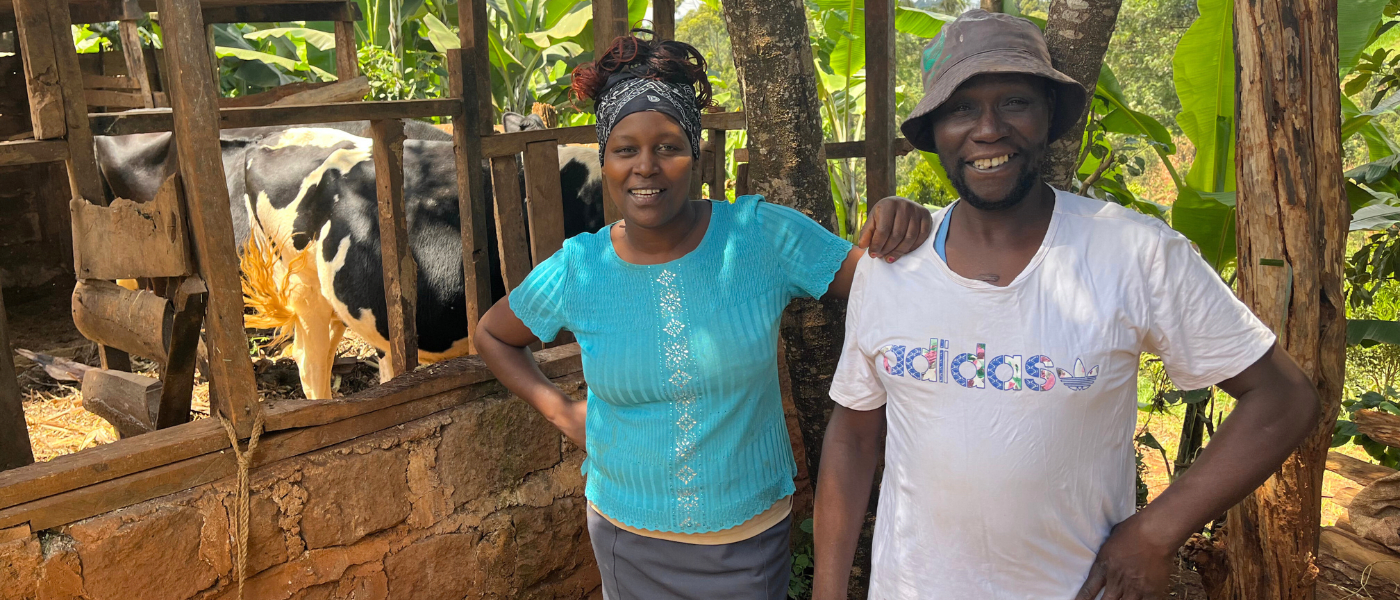 PHOTO: Eunice and her husband Henry on their dairy farm in Maganjo, Nyeri County, Kenya.
PHOTO: Eunice and her husband Henry on their dairy farm in Maganjo, Nyeri County, Kenya.
Today, she has two high-producing cows and a calf, providing 20 liters of milk a day. That success not only pays school fees for her children (her eldest is now at university!) but also supports her new coffee farm. The manure from her cows fertilizes the coffee, and the coffee income reinvests back into the dairy. It’s a cycle of resilience.
What struck me most was Eunice’s enthusiasm and generosity. By the time we returned for a follow-up visit, she had already been teaching her neighbors what she learned. In July 2025, she was even selected as a Community One Health Champion—a recognition of her leadership and her potential to spread change beyond her own farm.
Women at the Center
Many of the farmers and COHCs I trained were women. They were often the ones pushing their families to invest in dairy farming and encouraging neighbors to join trainings. Seeing women like Eunice and Ann not only embrace new practices but actively share their knowledge with others reinforced for me how central women are to sustainable farming and community resilience.
Lessons for Life
The placement wasn’t without challenges. Farmers sometimes came to us with practices or advice they had heard from different sources that weren’t always helping them achieve the best results. Navigating those moments required care. I learned to always start with encouragement—highlighting what farmers were already doing well, affirming their concerns, and then offering new approaches that could address the issues they were facing. This way, the conversation felt collaborative rather than corrective.
Working alongside Wakulima’s extension officers was also a highlight. Their deep understanding of the local context helped me bridge my veterinary training with the realities of Kenyan dairy farming. One officer, Martin, was particularly passionate about promoting Ayrshires and Jerseys as better-suited breeds than Holsteins for Kenya’s climate. His passion was infectious, and it reshaped the way I thought about breeds and breeding for long-term sustainability.
Looking Forward
What I took home from Kenya goes far beyond technical knowledge. I learned how to communicate across cultures, how to listen before advising, and how to find joy in small wins. The title “Animal Health Advisor” may imply that I came to teach, but in truth, I learned just as much—if not more—from the farmers, extension officers, and community members I worked with.
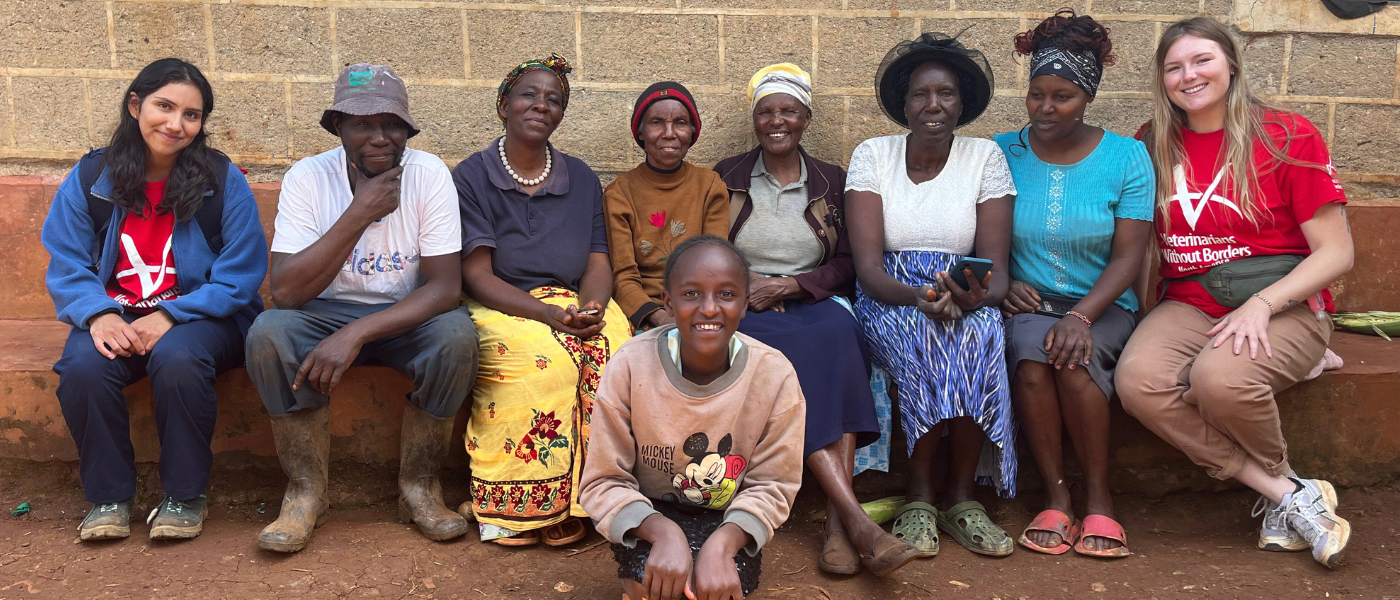 PHOTO: VETS volunteers Maddalena Jacobson (R) and Laura Vivas (L) with Eunice, Henry, and their family—sharing knowledge and celebrating community success.
PHOTO: VETS volunteers Maddalena Jacobson (R) and Laura Vivas (L) with Eunice, Henry, and their family—sharing knowledge and celebrating community success.
As I continue my studies at the Western College of Veterinary Medicine in Saskatchewan, I carry those lessons with me. This experience has forever shaped how I see my role as a future veterinarian: not just as someone who treats animals, but as someone who supports people, communities, and ecosystems in the process.
Kenya showed me that dairy farming is never just about milk. It’s about resilience, family, and the power of knowledge shared.
VETS is an 8-year initiative (2020-2028) to improve the economic and social well-being of marginalized people, particularly women and girls, in 6 countries across Africa and Asia. In collaboration with local partners, the program is implemented through 190 Canadian volunteers on international assignment and is generously funded by Global Affairs Canada. Learn more.

